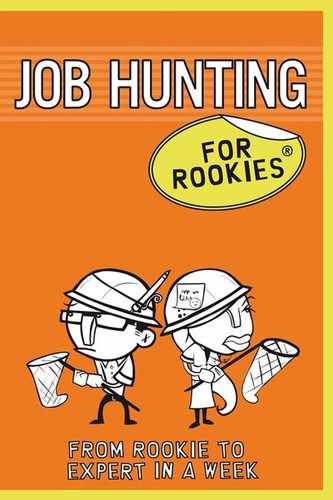CHAPTER 5
Enlisting support for
your job hunt
Understanding the facts about networking
Networking is simply about talking to people. By picking up the telephone, sending out the occasional email and meeting people in person, you serve two purposes:
1. You can ask people for advice, information and referrals to other people who might be able to help you find a job or point you in the right direction of job-leads.
2. You raise your profile and remind people that you exist! People can’t recommend you for jobs or tell you about job-leads if they forget that you are looking for a new job.
That’s all that networking involves. In fact, this is possibly the most important chapter in this book, so please take note! And here are five important facts about networking.
 Rookie Buster
Rookie Buster
Between 50 and 85 per cent of vacancies are filled by word of mouth.
Fact 1: Networking is simply about talking to people
Networking is simply a fancy word for getting in touch with people and asking for their help. For example, say a friend of yours (let’s call her Christina Jenkins) suggests that you speak to a friend of hers (let’s call him Stephen Birtwell). You might then phone Stephen up and say: “Hi, Christina Jenkins gave me your number and said that you might be able to help. Do you have a few minutes to talk on the phone?”

That’s all networking involves. All you need to do is pick up the telephone or send an email mentioning the name of someone you know. Pretty straightforward, right?
The good news when it comes to networking is that you don’t need to know anyone important. We are all connected to a network of friends, family members, ex-colleagues, and acquaintances. And, for the most part, they are all willing to help us.
 Rookie Buster
Rookie Buster
Networking is simply a fancy word for getting in touch with people and asking for their help.
Fact 2: Employers often prefer not to advertise
You may be wondering why so many jobs are filled by word of mouth. Many employers find that the payback simply isn’t good enough to justify the cost of an advert in the press or online. And some employers prefer not to advertise because they find that candidates who come to them by way of word-of-mouth referrals tend to be of a higher calibre than those who respond to job adverts.
Fact 3: Networking generates better quality job opportunities
Networking not only opens up a greater quantity of jobs but also a better quality of job vacancies too. The best jobs are often filled by someone who knows someone who knows someone. People are much more likely to recommend a job to their friends and contacts when the role is interesting and the pay is good.
It’s often the less desirable jobs that end up getting advertised. So networking is a much more successful technique for job hunting than relying on recruitment consultants or online job websites.
Fact 4: People are usually happy to help
I can understand if you feel a bit unsure about the idea of having to get in touch with people. But trust me when I say that the vast majority of people are usually only too happy to help.
If someone rang you and told you that a mutual friend had recommended you as an expert in your field, wouldn’t you be able to spare them 15 minutes of your time? I would. And I often do!
So long as you phrase your request in the right way (which we shall come on to later in this chapter), you will almost certainly find that most people are very willing to share their ideas and advice.
Getting ready to network
You need to take two steps before picking up the telephone.
1: Listing your contacts
The good news is that the first step is very easy. Begin by listing all of the people you know – yes, everyone. Take a sheet of paper and jot down the names of everyone you can think of.
Consider the names of current and previous colleagues, customers and clients, suppliers, people you know through professional or voluntary associations. Think about accountants, lawyers, web designers, and any other advisers or consultants you may have used or come across. Think also about your life outside work – what about people from social, community, sporting or religious organizations? How about people from school or university, military service, even neighbours, and of course family too?
You may be tempted to shorten this brainstorming process. You may believe that certain people will be more useful than others – and you’re right. But bear in mind that family and close friends may be more likely to want to help – even if they can’t point you immediately in the direction of your dream job.
Keep scribbling until your list hits at least 200 people. Once you’re done, you can prioritize the names based on two criteria:
• Likely usefulness. An ex-colleague who works in the same field as you may be more influential or better connected than a colleague who worked in a different department. Or a friend who is in charge of a department may have more contacts than another friend who is just starting out in his career.
• Strength of relationship. A close friend is probably more willing to spare the time and enthusiasm to listen to you and coach and advise you than someone you see as more of an acquaintance.
To prioritize your list of names, draw up a simple table, copy across the names from your list, and allocate between one and three stars to each name depending on how you rate their likely helpfulness. Then allocate between one and three ticks to each name based on the strength of your relationship with them. Here’s an example:
Name Holly Kennedy Parminder Singh Mary Tsoi Richard Jefferson |
Usefulness
|
Relationship
|
2: Writing your networking script
Nearly time to pick up the telephone. But before you do, you may want to figure out what you want to say. You need to introduce yourself (and your request) in a professional, yet friendly manner.
I strongly recommend that you write out – at least in draft form – what you want to say in the form of a networking script. Try to cover the following points:
1. A single sentence describing your profession or the type of work you do.
2. Mention of how you got this person’s name. For example: “I spoke to your ex-colleague, Catherine Wallace, who suggested that you wouldn’t mind taking a call from me.”
3. Your current situation, and what this person could do for you. For example: “I’m looking for a job and Catherine suggested that you might have some advice for getting into the sales function of a large corporate” or “I’m thinking about changing career and moving into publishing, and Catherine suggested that you would be an excellent person to talk me through some of the pros and cons of working in publishing.”
Over the page is an example of the basic structure of a networking script.
“Hello. My name is ________________ and I currently work as a ________________. I got your name from ________________ who knows you from ________________. S/he suggested that I talk to you because I am currently ________________. Would you have a few minutes to speak now or is there another, more convenient time when I could call you?”
If you’re polite and professional enough, you may be surprised to find that most people will say “yes” to your request. So long as you are only asking for some of their time on the telephone, most people are only too pleased to help.
When deciding what you would like from the other person, remember that you are networking for two reasons:
1. To gather advice, information, and referrals from other people.
2. To raise your profile and remind people that you exist.
Take a look at the following examples of networking scripts:
• “Hello. My name’s Marcus Carrick and I’m a human resources manager. Jeffrey Buckingham – who I believe used to be an ex-client of yours – suggested that I get in touch with you. Jeff said that you’re really well connected with consumer goods companies so I was hoping to ask your advice as I’m currently looking to move into that sector. I’m not begging for a job – just looking for some advice. Would you have fifteen minutes at some time in the future when I could call you and hear some of your thoughts, please?”
• “Hi. My name’s Alison Dale. I got your name from Laura Hollins, who suggested that you might be able to help. I’m thinking about changing career direction and becoming an acupuncturist. Laura suggested that you’d be a great person to talk to for advice as you did just that. Would you have fifteen or twenty minutes to talk me through your experiences of it and how you found the transition, please?”
So what are you going to say when you pick up the telephone?
Making your first call
When you’ve written your introductory script, you’re ready to make your first call. Of course you want everyone in your network to be on the lookout for job vacancies and to recommend you for jobs. But before you can do that, you need to think about who to call first.
I recommend that you avoid calling the most influential and important people on your list first. To begin your networking campaign, practise on friends who won’t mind if you mess up. Hone your networking skills and telephone manner on friends who may be less helpful, but with whom you have strong relationships.
Look over your prioritized list of contact names and choose a halfdozen people with whom you have “three tick” relationships that rate as only either “one star” or “two stars” in terms of potential usefulness. These “three tick” people – in other words, your friends – are more likely to forgive you if you are less than entirely smooth and professional. So it doesn’t matter if you make a mistake.
Once you have worked through a few of your friends, ask yourself how those conversations went:
• Did you explain your situation and what you need clearly?
• Did you get the information and/or referrals to other people that you wanted?
 Rookie Buster
Rookie Buster
To begin your networking campaign, practise on friends who won’t mind if you mess up.
If you feel that you need further practice, keep calling friends until you have polished your telephone manner. Once you have built up your confidence, you can then work on people whom you rate more highly in terms of potential usefulness.
Making the most of networking conversations
Most people are more than happy to help. So what should you say to them once you get them back on the telephone (or even face to face)?
Whatever questions you decide to ask, bear in mind that preparation is the key here. You will need to prepare questions that suit your personal situation. But here are some suggestions.
Questions for career change
If you are looking to change careers, consider questions such as:
• What’s the day-to-day work like? Could you talk me through an average week, please? What do you most enjoy and dislike?
• What are the typical working hours like?
• What are the financial rewards like to begin with? And how much do people tend to earn three, five, and ten years after they begin in it?
• How did you get into the field? What training or qualifications did you need? And do you know of any people who got into this field without that training or qualifications?
• As I’m thinking about entering this field, what advice would you have for me?

Questions about a specific organization
Sometimes you may be looking for help getting a job in a particular organization. Perhaps you have an interview coming up with the organization. Or you may just like the organization and want to work for it should any opportunities arise there.
Networking can allow you to gather more information about a specific organization. You may, for example, have tracked down someone who either currently works in that organization or previously worked there; or you may be speaking to someone who knows a lot about that company. Consider asking questions such as:
• What’s the culture of the organization like?
• What are the pros and cons of working for the organization?
• Apart from what I’ve been able to find out in the general news and online, what else is there that you can tell me about the organization and the sector in which it competes?
• I have an interview there coming up – what advice can you offer me about the recruitment and selection process?
 Rookie Buster
Rookie Buster
Networking can allow you to gather more information about a specific organization.
General questions for job hunters
As a smart job hunter, you should prepare questions for each and every person that you speak to. The questions you ask one person in your network are likely to be quite different from the ones you ask someone else. However, depending on the circumstances and how well you know someone, here are some more suggestions of questions that you could ask:
• I’d really like to work in your industry – if I send you my CV, could you give me a few minutes’ worth of feedback please?
• I’m not asking you for a job, but if you come across any suitable opportunities, could you let me know, please?
Questions asking for further introductions
One of your aims whenever you speak to anyone should be to ask for introductions to further people. Remember that the purpose of networking is to grow the number of people who know you and could recommend you for a job. Consider asking for a referral every time you speak to someone new. Here are some suggestions for how you could phrase your requests:
• Can you think of anyone else I could speak to who might have information on the profession or advice on getting into it? And would you mind if I call them and mention your name?
• Can you think of anyone else I could speak to in order to get further information about the organization?
• I’d really like to work for your organization – can you think of anyone I could speak to, such as a human resources manager or a hiring manager that I could speak to?
 Rookie Buster
Rookie Buster
Consider asking for a referral every time you speak to someone new.
Growing your network
Whenever possible, try to meet influential people (your “3-star” contacts in terms of usefulness) in person rather than speaking simply over the telephone. Ask for a mere 20 minutes of their time (because 20 minutes doesn’t sound very much and so it makes it harder for people to turn it down). Offer to go to their workplace, to meet them for a coffee before work, a sandwich at lunch, or a drink after work.
Be sure to dress appropriately in work attire – even if you are currently not working. And be certain to behave in a professional and enthusiastic manner at all times. No matter how downtrodden you may feel about your job situation, treat such networking meetings as a possible interview. When networking, you are being evaluated as much for how you come across as for what you actually say. Even if the person you’re speaking to doesn’t have the power to offer you a job directly, he or she is still evaluating you and deciding whether to introduce you to other people who could possibly offer you a job.
 Rookie Buster
Rookie Buster
When networking, you are being evaluated as much for how you come across as for what you actually say.
Maintaining your network
Speaking to people or meeting them once is only the start of the networking process. People are busy and – even if they have the best intentions of looking out for suitable job-leads for you – will tend to forget. It’s up to you to maintain the relationship by reminding people that you exist.
Keeping track of your contacts
Be sure to write up notes after every phone call or meeting to summarize not only the work-related information that you wanted, but also the work and non-work information that people may share with you about themselves. Keep track of the fact that someone is moving house or just got promoted, or that their daughter is taking an important set of exams in the next few months.
Doing so allows you to maintain a rapport. So if you get in touch again in the future, it allows you to drop these facts back into the conversation and make other people feel valued.
Looking for genuine reasons to get in touch
Look for mentions of a person’s organization in the news and get back in touch if it seems appropriate. Forward articles or clippings that may be of interest. Sometimes you may wish to get in touch purely because something else you read or heard about has triggered a thought – for example “I met someone who does a very similar role to you but in a very different industry and it made me think of you. How are you?”
Get in touch and convey that other people are in your thoughts. Do it and they will be more likely to remember you and point you in the direction of job-leads.

Coach’s notes 
• Remember that networking simply involves picking up the telephone to ask friends and acquaintances for a few minutes of their time – there’s nothing difficult or sinister about it!
• Refuse to network and you deprive yourself of a major asset when it comes to finding a job. Remember that between 50 and 85 per cent of all jobs are filled through word of mouth and networking!
• Kick off your networking campaign by listing everyone you know.
• Prepare a networking script to make sure that your conversations go smoothly.
• Hone your networking skill by practising first on sympathetic friends before you pursue the more influential (but possibly more challenging) people within your network.
• Always ask for introductions to further people, as that’s the only way your network will grow!
• Keep notes on the people you encounter and think about ways to maintain the relationship with them so that they don’t forget about you.
Go for it! Give networking a go and give yourself the best possible chance of securing a great job. A lot of people are too lazy to bother networking – but not you! Remember that networking is possibly the most powerful tool in your job-hunting kit. Start networking and you will almost certainly find that it is much easier (and more effective) than you might expect. No time like the present to give it a go!

Notes |

